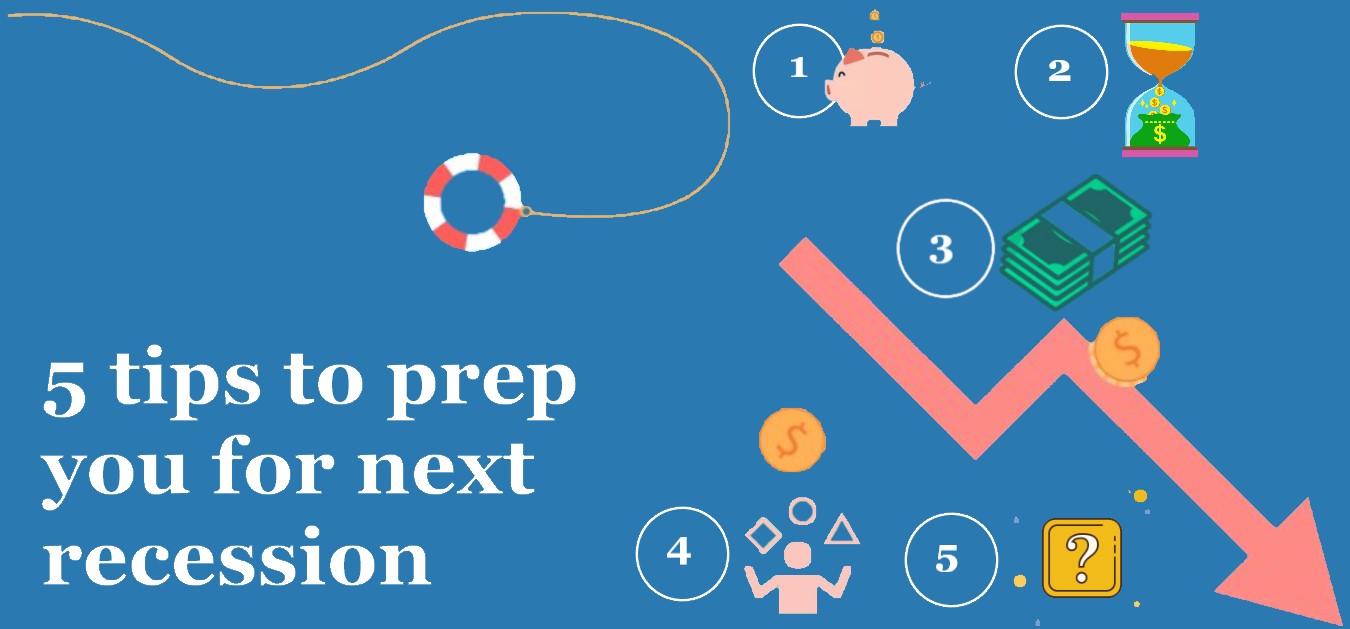- Will there be a recession?
- How to know if there is a recession?
- How to survive the next recession?
Are these questions running in your mind and keeping you awake? Then we are here to help you. Follow these 5 tips can give you a peace of mind and required financial freedom during difficult times.
Table of Contents
What is a recession?
The working definition of a recession is two consecutive quarters of negative economic growth as measured by a country's gross domestic product. A recession is where the GDP of a country falls down, so companies optimize their operating costs to survive a recession. Paying salaries to employees is the bigger chunk of any company’s OpEx, so you see layoffs during the recession. Once unemployment increases then you see cascading effects less spending, stock market decline, and finally the housing market will fall.
What is an emergency fund?
An emergency fund is a personal saving set aside by following a strict budget on your expenses to provide a financial safety net during difficult times or when the unexpected expenses.
5 Tips
Tip 1: Increase savings by optimizing spending habits
Cash is King, so to be prepared for a potential recession the first thing you need is to create an emergency fund. Your emergency fund should at least help you survive for 6 months, so start creating an emergency fund (recession fund) and do not use it until you really need it. Create a budget plan and strict to that plan, avoid unnecessary spendings like eating out, big purchases, after a month moves all the savings to your emergency fund. Evaluate your credit card bills month by month and optimize your spendings and iterate on your budget plan.
Tip 2: Do systematic investment

Keep investing! Continue to invest in the market or mutual funds or bonds or real estate based on your style of investment. What history teaches us about recessions, people will be in a panic and withdraw all money from the market and if you are a disciplined long term investor with systematic investments, history shows that these investments during the recession have higher returns than during regular periods. Be Fearful When Others Are Greedy and Be Greedy when Others are Fearful. Stocks are on sale when the market is in panic and you can get good stocks at a discount price. Stats show that the GDP of India during the 1991 recession was $266 Billion (inflation-adjusted) and it rose to $3 Trillion in 2019 (1100% increase).
Tip 3: Create alternative income
Look for alternative income. See if a part-time job allows you to bring in extra money. Save these extra funds into your emergency fund and use it when you need it the most. During the recession, we see a lot of layoffs so be prepared and boost your skills to find alternative careers. Invest time in your career growth.
Tip 4: Spend time with Family
Spending quality time with family will help you reduce anxiety and stress. Also if you do not have one, try to get medical insurance, during recessions having medical insurance can give you peace of mind and does not impact your emergency funds.
Tip 5: Check government benefits if it’s needed
During recessions, governments announce stimulus packages to provide support during difficult times. You need to constantly read news and be aware of what’s going on and take advantage of any such benefits. For eg: During COVID-19, RBI announced a relief package and requested lenders to provide a grace period of three months for payments of EMIs. You need to carefully read all instructions and conditions carefully. In this case, the relief is only to postpone the payments but lenders are free to levy interests on the unpaid amount. So we recommend paying dues and EMIs. Once you establish emergency funds payments like these would not be a burden during difficult times.
The Bottom Line
There is no need to panic about recession, instead, you need to be prepared to face it. Do more homework by budgeting your expenses, cut unwanted expenses, and save as much as possible to create your emergency fund. Spend quality of time with family to overcome stress and anxiety, and invest in your career.
